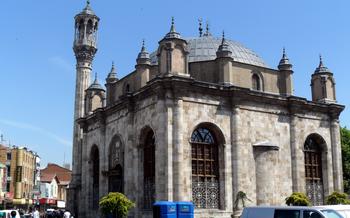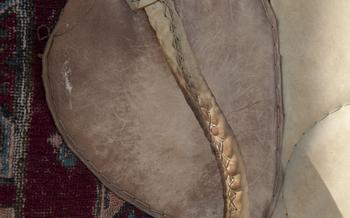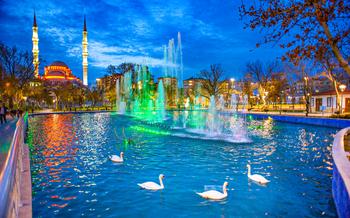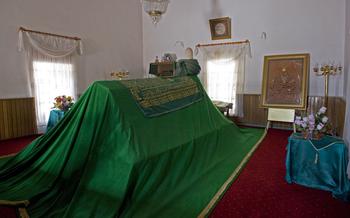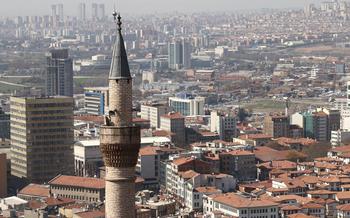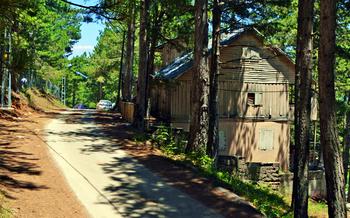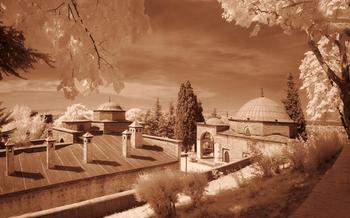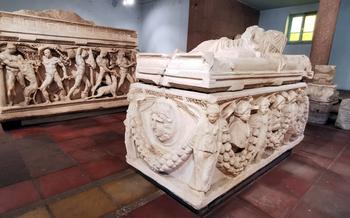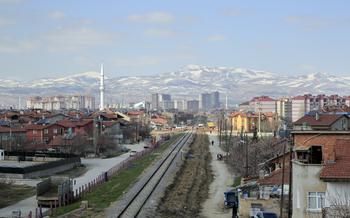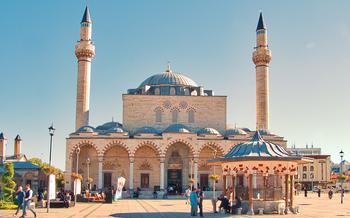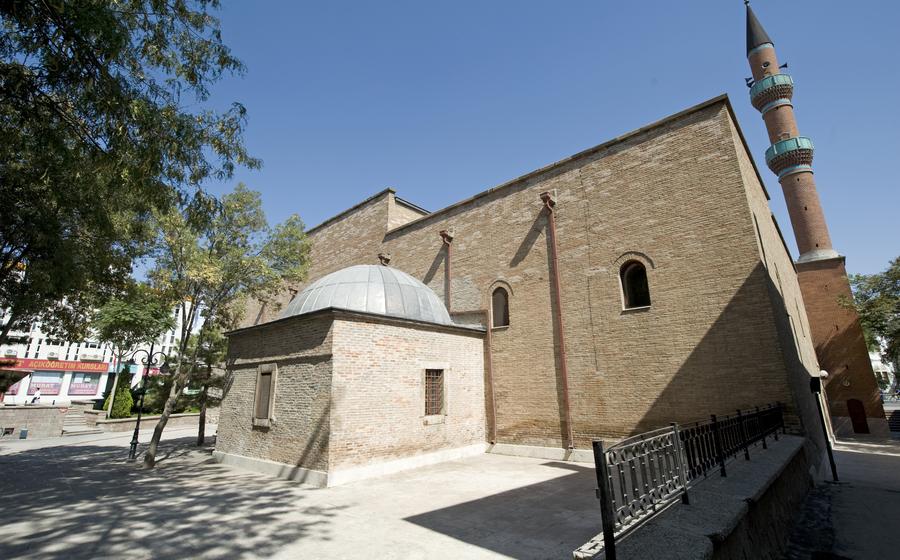
Iplikci Mosque
- Historical Significance
- Architectural Marvel:
- Interior Beauty
- Historical Context
- Visiting the Mosque
- Dress Code
- Prayer Times
- Photography and Videography
- Local Cuisine
- Souvenirs and Handicrafts
- Historical Tours
- Festivals and Events
- Accommodation
- Transportation
- Insider Tip: Unveiling Konya's Hidden Gem, the Aziziye Mosque
Historical Significance
The Iplikci Mosque stands as a testament to the rich history and cultural heritage of Konya. Built during the Seljuk period, it represents the architectural prowess and religious devotion of the era. The mosque's construction dates back to the 13th century, making it one of the oldest surviving mosques in the city. Its unique architectural style blends elements of Seljuk and Anatolian design, reflecting the cultural fusion that characterized the region. As a symbol of Islamic architecture, the Iplikci Mosque holds a significant place in Konya's religious and cultural landscape, inviting visitors to explore its historical significance and architectural marvels.
Architectural Marvel:
The Iplikci Mosque stands as a testament to the architectural prowess of the Seljuk era. Constructed using a combination of stone and brick, the mosque showcases intricate carvings and decorations that adorn its exterior, creating a mesmerizing visual spectacle. The grand entrance, adorned with elaborate stonework, invites visitors into a world of spiritual tranquility and architectural grandeur. The mosque's dome, a symbol of Islamic architecture, dominates the skyline, while the slender minaret, with its intricate tilework, serves as a beacon of faith, calling the faithful to prayer. Every element of the Iplikci Mosque's design harmoniously blends to create a masterpiece of Islamic architecture that leaves visitors in awe.
Interior Beauty
The Iplikci Mosque's interior is a testament to the artistry and craftsmanship of the Seljuk period. The spacious prayer hall features a simple yet elegant layout, with rows of columns dividing the space into aisles. The walls are adorned with intricate tilework and calligraphy, creating a visually stunning effect. The tiles feature geometric patterns and floral motifs, while the calligraphy includes verses from the Quran and the names of Allah and the Prophet Muhammad.
The mihrab, or prayer niche, is the focal point of the mosque's interior. It is a beautifully carved niche in the wall that indicates the direction of Mecca. The mihrab is decorated with intricate tilework and calligraphy, and it is topped by a semi-dome that is adorned with stalactites. The minbar, or pulpit, is another notable feature of the mosque's interior. It is a raised platform that is used by the imam to deliver sermons. The minbar is made of wood and is decorated with intricate carvings.
Historical Context
Konya, a city in central Turkey, holds significant historical and cultural importance, particularly during the Seljuk period. The Iplikci Mosque stands as a testament to this era, serving as a symbol of Islamic architecture and religious devotion. During the Seljuk reign, Konya flourished as the capital of the Sultanate of Rum, becoming a center of Islamic learning and culture. The city attracted renowned scholars, poets, and mystics, including the revered Mevlana Jalaluddin Rumi, the founder of the Mevlana Order. The Iplikci Mosque played a pivotal role in the city's religious landscape, serving as a place of worship, learning, and spiritual guidance for the local community. Its connection to Rumi and the Mevlana Order further enhanced its significance, making it a popular destination for pilgrims and visitors seeking spiritual enlightenment. Other notable historical sites in Konya that visitors can explore include the Mevlana Museum, the Alaeddin Mosque, and the Sille district, each offering a glimpse into the city's rich past.
Visiting the Mosque
The Iplikci Mosque, with its historical significance and architectural beauty, welcomes visitors from all over the world. To ensure a respectful and enjoyable visit, here is some practical information:
Location and Accessibility: The mosque is conveniently located in the heart of Konya, within easy walking distance from other historical sites and attractions. Visitors can reach the mosque using various public transportation options, including buses and trams. The nearest tram stop is the Alaeddin Keykubat Tram Station, a short walk from the mosque.
Best Time to Visit: To avoid crowds and fully appreciate the mosque's tranquility, it is advisable to visit outside of regular prayer times. Early mornings or late afternoons are ideal for a peaceful exploration.
Rules and Guidelines: Visitors are expected to dress modestly and respectfully while inside the mosque. Removing shoes before entering the prayer hall is customary, as a sign of reverence. Maintaining silence and refraining from disturbing worshippers during prayers is essential.
Additional Tips: To enhance your visit, consider hiring a local guide who can provide insights into the mosque's history and significance. Guided tours are available in various languages and can be arranged through reputable tour operators.
Dress Code
Respecting local customs and traditions is paramount when visiting the Iplikci Mosque. While Turkey is a predominantly Muslim country, it is crucial to dress appropriately to avoid causing offense or disrespect.
For Men:
- Modest attire is recommended, covering the knees and shoulders.
- Avoid wearing shorts, tank tops, or revealing clothing.
- Long-sleeved shirts and trousers are ideal for a respectful visit.
For Women:
- Women should dress conservatively, covering their hair, arms, and legs.
- A headscarf or shawl is necessary to cover the head.
- Long, loose-fitting clothing is appropriate for women visitors.
Prayer garments are available at the mosque for visitors who need them. It is advisable to inquire at the mosque's entrance or with a local guide to ensure proper attire. By adhering to the dress code, visitors can show respect for the sanctity of the mosque and the local culture.
Prayer Times
The Iplikci Mosque, like all mosques, adheres to the five daily prayer times prescribed in Islam: Fajr (dawn), Dhuhr (noon), Asr (afternoon), Maghrib (sunset), and Isha (night). These prayers are not only a religious obligation for Muslims, but also a communal and spiritual experience. Visitors to the mosque are welcome to observe the prayers, but it is important to be respectful and maintain silence.
For non-Muslim visitors, it is an opportunity to gain insights into the Islamic faith and its practices. Guided tours are available for those who wish to learn more about Islam and its significance in Turkish culture. These tours typically provide explanations of the different prayers, the architecture of the mosque, and the role of the mosque in the community.
To ensure a harmonious and respectful environment, visitors are encouraged to dress modestly and avoid disruptive behavior during prayer times. By observing these guidelines, visitors can contribute to the peaceful and spiritual atmosphere of the mosque.
Photography and Videography
The sanctity of the Iplikci Mosque requires visitors to be mindful of the worshippers and the mosque's spiritual significance. While photography and videography are generally permitted, it is crucial to respect the privacy of those in prayer and to avoid causing any disturbance. When taking photos, be discreet and ensure that the flash is turned off. Tripods and selfie sticks are not allowed inside the mosque.
For those interested in capturing the beauty of the mosque, professional photography services are available. Visitors can inquire at the mosque's information desk for more details. These services often include guided tours that provide insights into the mosque's history and architecture, along with the opportunity to take photos without disturbing the worshippers.
Local Cuisine
Konya's culinary scene is a delightful blend of traditional Turkish flavors and unique regional specialties. To fully immerse yourself in the city's culture, be sure to sample some of the local dishes. Start your culinary journey with "etli ekmek," a mouthwatering flatbread topped with minced lamb, tomatoes, and onions. This savory dish is a local favorite and can be found in many restaurants and street food stalls. For a taste of traditional Turkish cuisine, try "mantı," delicate dumplings filled with ground lamb or beef, served in a yogurt-garlic sauce. Konya is also renowned for its "fırın kebabı," tender lamb or beef slow-cooked in a clay oven with aromatic spices. Vegetarian options are not neglected in Konya. "Bamya yemeği," a hearty okra stew, and "sulu köfte," meatballs simmered in a tomato-based sauce, are both delicious and widely available. To satisfy your sweet tooth, indulge in "mevlana tatlısı," a traditional dessert named after the city's spiritual leader, Rumi. This heavenly treat is made with layers of phyllo dough, walnuts, and a sweet syrup. Remember, food holds a special place in Turkish culture, and sharing a meal is a symbol of hospitality. Don't hesitate to ask for recommendations or try new dishes; you might just discover your new favorite flavor. For Muslim visitors, finding halal food options is not a problem in Konya. Most restaurants and food stalls serve halal meat, and there are dedicated halal restaurants as well.
Souvenirs and Handicrafts
The vibrant shopping scene near the Iplikci Mosque offers a treasure trove of souvenirs and handicrafts that reflect the rich cultural heritage of Konya. From traditional Turkish carpets and textiles to intricate pottery and jewelry, there's something for every taste and budget.
Stroll through the bustling markets and shops lining the streets surrounding the mosque, and you'll be greeted with a symphony of colors, textures, and aromas. Discover unique souvenirs such as handmade copperware, intricately painted ceramics, and colorful kilims that tell stories of Anatolian nomadic life.
When shopping for souvenirs, remember to support local artisans and preserve traditional crafts by buying directly from the makers. Don't be afraid to engage in friendly bargaining, as it's a customary part of the shopping experience in Turkey. With a bit of patience and negotiation, you can score great deals on beautiful and authentic souvenirs.
To take home a truly special piece of Konya, consider visiting the workshops of local artisans. Learn about their techniques and watch them transform raw materials into exquisite works of art. You'll not only get a unique souvenir but also support the livelihood of these talented craftspeople.
Shopping for souvenirs and handicrafts near the Iplikci Mosque is an immersive experience that allows you to connect with the local culture and take home a piece of Konya's rich heritage.
Historical Tours
Konya offers a range of historical walking tours that provide an in-depth exploration of the city's rich past. These tours often include visits to multiple historical sites, including the Iplikci Mosque. Led by knowledgeable guides, these tours offer insights into the history, architecture, and cultural significance of Konya's landmarks.
By joining a historical walking tour, visitors can gain a deeper understanding of the Iplikci Mosque's role in the city's religious and cultural landscape. Guides can share stories and anecdotes about the mosque's construction, its connection to the Mevlana Order, and its importance as a symbol of Islamic architecture.
For those interested in a more personalized experience, private guided tours are also available. These tours can be customized to suit specific interests and preferences, allowing visitors to explore the mosque and other historical sites at their own pace.
To ensure a memorable and informative experience, it is recommended to book tours in advance, especially during peak tourist season. Reputable tour operators and guides can be found online or through local tourism offices.
Festivals and Events
Konya is a vibrant city that hosts a variety of cultural festivals and events throughout the year, offering visitors a chance to immerse themselves in the rich traditions of the region. These events showcase traditional Turkish music, dance, and folklore, providing a glimpse into the city's cultural heritage.
One of the most significant events in Konya is the annual Mevlana Festival, held in honor of the renowned Sufi mystic Rumi. The festival features a series of concerts, exhibitions, and performances that celebrate Rumi's teachings and legacy. Visitors can witness whirling dervishes, listen to traditional Sufi music, and participate in cultural workshops.
Another popular event is the Konya Food Festival, which showcases the city's diverse culinary offerings. Visitors can sample traditional Turkish dishes, such as Konya's famous etli ekmek (flatbread with meat), as well as international cuisine. The festival also features cooking demonstrations, workshops, and competitions.
For those interested in history and culture, the Konya International Film Festival screens a selection of local and international films that explore Turkish history, society, and culture. The festival provides a platform for filmmakers to showcase their work and for audiences to engage in discussions about important social and cultural issues.
By attending these festivals and events, visitors can gain a deeper understanding of Konya's rich cultural heritage and experience the warmth and hospitality of the local people.
Accommodation
When seeking a place to stay, you'll find a plethora of hotels and guesthouses near the Iplikci Mosque, catering to a range of preferences and budgets. Prioritize choosing accommodations that align with your personal tastes and financial means. For a truly immersive experience, consider traditional Turkish guesthouses known as hanlar. These historic inns offer a unique blend of comfort and authenticity, allowing you to delve into the local culture while enjoying a restful stay.
Transportation
Reaching Konya and the Iplikci Mosque is relatively easy, thanks to the city's well-connected transportation network. Konya Airport (KYA) is the primary gateway, with regular flights from major cities in Turkey and beyond. From the airport, visitors can take a taxi or bus to reach the city center. Konya's public transportation system is efficient and affordable, with buses and trams connecting various parts of the city. The Iplikci Mosque is conveniently located near several bus stops, making it easily accessible. For those who prefer a more flexible option, taxis are readily available and offer a comfortable and convenient way to get around. Alternatively, rental car services are available for visitors who want the freedom to explore the city and its surroundings at their own pace.
Insider Tip: Unveiling Konya's Hidden Gem, the Aziziye Mosque
Beyond the grandeur of the Iplikci Mosque, Konya holds another architectural treasure that often goes unnoticed by visitors. Nestled in the heart of the city, the Aziziye Mosque stands as a testament to the rich Seljuk heritage that permeates Konya's landscape. Built in the 17th century, this hidden gem boasts a unique blend of Ottoman and Seljuk architectural styles, creating a captivating fusion of artistic influences.
Explore the mosque's tranquil courtyard, adorned with intricate tilework and serene fountains, before stepping into its awe-inspiring interior. The spacious prayer hall is adorned with elegant chandeliers and features a remarkable wooden mihrab, a testament to the skill of Seljuk artisans. As you wander through the mosque, take a moment to admire the stunning stained-glass windows that cast a kaleidoscope of colors onto the marble floors, creating an ethereal ambiance that invites contemplation and serenity.
While the Iplikci Mosque undoubtedly holds a prominent place in Konya's Islamic architecture, the Aziziye Mosque offers a unique and intimate glimpse into the city's rich past. Whether you're a history buff, an architecture enthusiast, or simply seeking a moment of tranquility, the Aziziye Mosque awaits your discovery.
